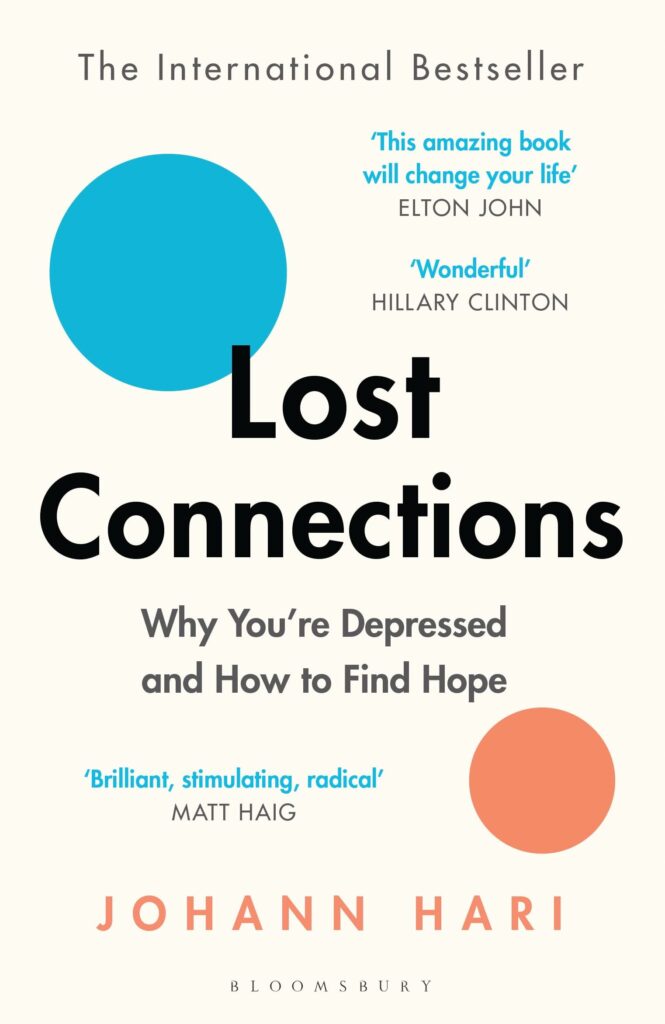Writer, Illustrator, Philosopher
“Lost Connections” by Johann Hari

Depression and anxiety are now so widespread that it is tempting to see them as by-products of modern society itself, as the necessary price we pay for the techno marvels of our media-saturated, super-connected and fast paced world. Of course, as attested by the melancholia of the ancient Greeks, the demonic possession of medieval times, or the various strains of Freudian psychopathology, the basic mental categories involved are far from new. Some of us, it seems, have always suffered in these ways, and (as a consequence of human nature itself, it is often implied) will no doubt continue to do so.
But if there is something that distinguishes the modern phenomena of depression and anxiety, it is their scope. As Hari points out, around 1 in 5 US adults is currently taking some form of psychiatric medication. More specifically, recent figures suggest that around 13% of the US population now take antidepressants, with the UK not far behind – and the figures are rising. But why is this? Are the inhabitants of modern societies getting more anxious and depressed? Or is there some other reason? And, more importantly, what can we do about it? Lost Connections is Johann Hari’s attempt to answer these questions, which, as a long-term user of antidepressants, he would also seem to be in a good position to ask.
Hari’s account of his experience on antidepressants will no doubt resonate with many fellow sufferers: the initial revelation (depression is merely a chemical imbalance in the brain), the relief (this imbalance can be redressed by medication), followed by the familiar pattern of diminishing returns, as the initial effect of the drugs is short lived (the initial dose must be increased, then increased again, then swapped for another brand, then that at a higher dose, then switched again for another drug… and so on). But Hari’s book is not a misery memoir; the personal experiences he recounts are not cries for sympathy or a need to share, but each is rather carefully chosen to illustrate key points and to underline his own sincere investment in the answers to the questions he seeks. As such, while it is in one sense a very personal book, it is also a keenly critical investigative journey. So, what does he find?
However, the author is not content with casting doubt on the efficacy of antidepressant medication, and looks first at what – if not brain chemistry – might be causing the current epidemic of depression and anxiety, before going on to suggest some possible solutions. In a nutshell, Hari argues, we are depressed and anxious because the world is depressing and anxiety making. We suffer because we are lonely; we live in isolated pockets, cut off from family and the wider community. Our work life is boring or stressful, and we are denied the meaning and sense of self-worth that a genuine task would provide. Stuck in dead-end jobs, in rigid hierarchies under uncaring bosses, we are denied status and a sense of purpose. We are cut off from the natural world, from the solace and sense of group belonging that evolution has programmed us to seek. As the impersonal machine of modern capitalist society churns on, it also ignores the cries for help that its inhumanity generates, failing to deal with childhood trauma and abuse, bereavement or other common negative experiences simply because the other cogs in the machine don’t have the time or energy to listen. Interestingly, Hari also largely dismisses the genetic causes, arguing that in depression and anxiety genes play at most a triggering role, making some of us merely more likely to develop symptoms under certain circumstances – and which in turn can be addressed best by social or psychological means. In summary, Hari concludes, depression and anxiety are determined by how people treat each other; their cure is therefore to change or redress that – to get a more meaningful job, to reconnect to each other and nature, to expand your sense of self through a sense of community, to give people a sense of security (perhaps through a universal basic income), or to break through the restrictions of the ego (through meditation, even perhaps micro-doses of magic mushrooms!).
For those suffering from anxiety or depression, some of these solutions may seem platitudes which ignore the seriousness of their condition. “Get some fresh air!”, “Go to the gym!”, and other well-meaning if misdirected advice, will be familiar to many sufferers. But Hari is not offering such platitudes. Faced with the reluctant conclusion that the drugs don’t work, his answers are not the bland prescriptions of someone with no empathy, but rather the tentative suggested steps of a fellow sufferer that he himself has begun to take. In this sense, the book’s humility and lack of dogma are its key strengths. It does not provide simple, clear cut answers, and the ones it does suggest imply a monumental task – that it is society that needs to change, not just the individual. However, it is an important and inspirational book, one which will hopefully inspire you to seek your own solutions, while providing intelligent and intriguing signposts to where you might possibly find them.
Buy Book
Gareth Southwell is a philosopher, writer and illustrator from the UK. He is the author of the near-future sci-fi novel MUNKi, which concerns robots, the hunt for the Technological Singularity, and people swearing in Welsh.
Note: due to spam, comments have been disabled on this post, but you are welcome to contact the author to discuss further.